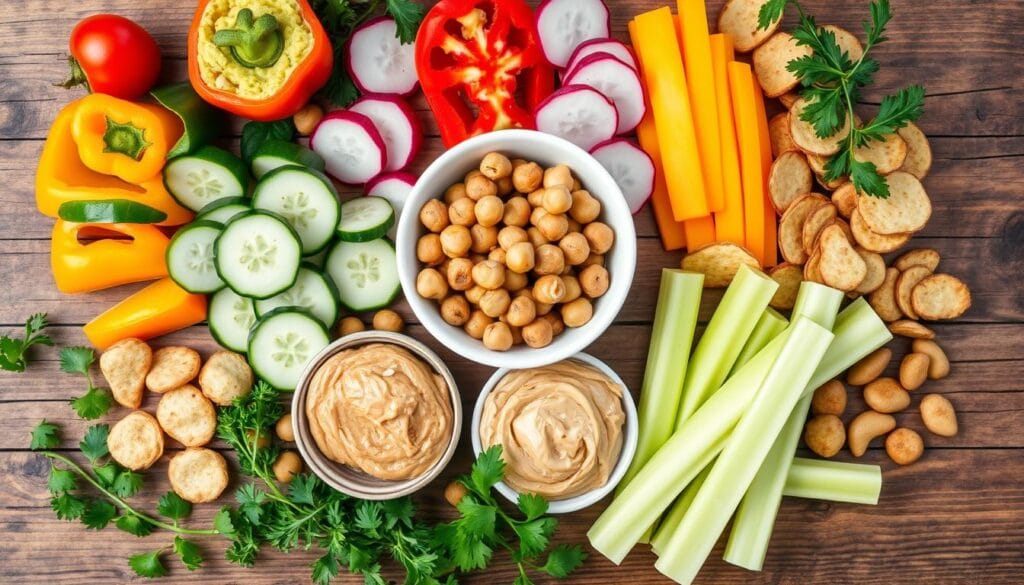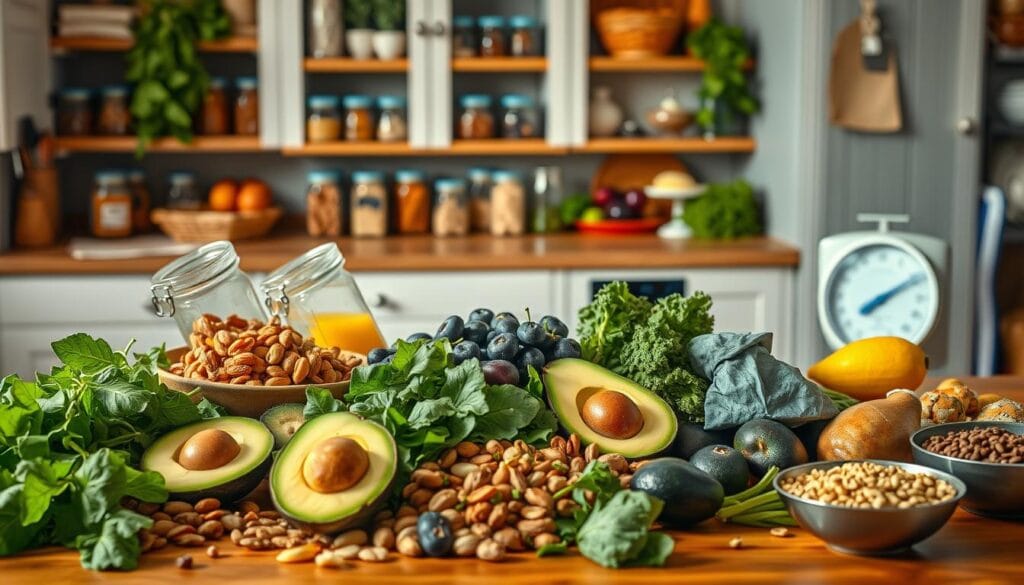I remember the day I found out how tasty low carb vegan recipes could be. I was stuck with boring meals and didn’t know what to eat. Then, I discovered a world of plant-based cooking that changed my life.
These recipes aren’t just about cutting carbs. They’re about making meals that are full of nutrients and taste amazing. They make you feel good and taste great.
If you’re a vegan or just trying plant-based meals, this guide will change your view on food. You’ll find dishes like zucchini noodles and tofu that are both healthy and delicious. The Harvard T.H. Chan School of Public Health says plant-based proteins can really improve your diet.
Table of Contents
Understanding the Low-Carb Vegan Lifestyle
Exploring a low-carb plant-based diet opens up a world of nutrition. It combines veganism with smart carb management. This is a great choice for those who care about their health.
Benefits of Following a Low-Carb Plant-Based Diet
Choosing a low-carb vegan lifestyle has many health benefits. It helps with weight management, blood sugar control, and inflammation. It also boosts heart health and supports eco-friendly eating.
Essential Nutrients for Low-Carb Vegans
Creating a high-protein vegan low-carb diet needs careful planning. Look for plant-based proteins that are rich in amino acids but low in carbs.
| Protein Source | Protein Content | Carb Content |
|---|---|---|
| Tofu | 8g per 100g | 2g per 100g |
| Tempeh | 19g per 100g | 9g per 100g |
| Hemp Seeds | 31g per 100g | 5g per 100g |
Recommended Daily Carb Intake
For the best results, aim for 100-125 grams of carbs daily. This range is flexible and supports your health goals.
“A thoughtful low-carb vegan diet isn’t about restriction, but about making intelligent nutritional choices.” – Nutrition Expert
By choosing nutrient-rich, low-carb plants, you can follow a diet that’s good for you and the planet. It makes your wellness journey more enjoyable and sustainable.
Essential Ingredients for Low-Carb Vegan Cooking
Making tasty vegan keto recipes means picking the right ingredients. Your diet needs smart choices to stay low in carbs but full of nutrients.
For high-protein vegan low-carb meals, focus on:
- Tofu
- Tempeh
- Seitan
- Pea protein powder
Keep your pantry stocked with must-have low-carb vegan items. Nuts and seeds are great for nutrition and healthy fats. Make sure you have:
- Almonds
- Chia seeds
- Walnuts
- Pumpkin seeds
“Strategic ingredient selection transforms your vegan low-carb cooking from bland to grand.”
Non-starchy veggies are key for tasty meals. Cauliflower, broccoli, zucchini, and bell peppers are top picks. They help keep your diet healthy and low in carbs.
Fats are also vital in vegan keto cooking. Use avocados, coconut oil, and extra virgin olive oil. This ensures your meals are not only tasty but also packed with nutrients.
Energizing Low-Carb Vegan Breakfast Recipes
Start your day with tasty vegan keto recipes that boost your energy and keep carbs low. A low-carb plant-based diet doesn’t mean missing out on flavor or nutrients. These breakfast ideas show that vegan weight loss recipes can be both tasty and energizing.
Your morning meal sets the tone for the day. Plant-based breakfasts offer key nutrients and support your health goals.
Avocado Tofu Toast Variations
Make your breakfast exciting with creative tofu toast recipes that are full of nutrients. Here are some tasty variations:
- Smashed Avo Tofu Toast: Mix firm tofu, olive oil, ripe avocado, lemon juice, salt, and pepper
- Mushroom & Spinach Tofu Toast: Add sautéed mushrooms, spinach, and kale on top
- Tofu ‘Bacon’ Topping: Use soy sauce, olive oil, maple syrup, mustard, smoked paprika, and garlic powder for a tasty topping
Protein-Packed Breakfast Bowls
Boost your morning with breakfast bowls that are packed with nutrients and support a low-carb vegan diet:
| Breakfast Bowl Option | Protein Content | Carb Content |
|---|---|---|
| Chia Seed Bowl | High Plant Protein | Low Carb |
| Purition Vegan Porridge | 16g Plant Protein | 2-4g Net Carbs |
| Tofu Scramble | 16g Protein | Under 2g Carbs |
Quick Morning Smoothies
Make these fast and healthy smoothies to kickstart your morning:
- Prepare make-ahead smoothie freezer packs
- Add plant-based protein powder for extra nutrition
- Include low-carb ingredients like chia seeds and spinach
“Breakfast is the most important meal of the day, especially on a low-carb vegan diet.” – Nutrition Expert
By choosing protein-rich, low-carb ingredients, you can make delicious vegan breakfasts that help with health and weight loss.
Satisfying Plant-Based Lunch Options
Discovering delicious low carb vegan recipes for lunch can turn your midday meal into an exciting adventure. Plant-based low-carb meals are both nutritious and tasty. They keep you energized all day long.
Ready to explore some mouthwatering vegan low-glycemic recipes? Here are some incredible lunch options that will keep you satisfied and healthy:
- Vegan “Tex-Mex” Salad with Tofu Crumbles
- Protein-rich tofu crumbles
- Fresh pico de gallo
- Creamy avocado
- Spicy Weight-Loss Cabbage Soup
- Low-calorie option
- Nutrient-dense ingredients
- Meal prep friendly
“Eating vegan doesn’t mean compromising on taste or nutrition!” – Plant-Based Chef
Your lunch can be both exciting and nutritious with these innovative recipes. Whether you’re craving a zesty salad or a hearty soup, these plant-based options will keep you full and energized.
- Quick Lunch Ideas:
- Chickpea Avocado Salad (22g protein)
- Vermicelli Noodle Bowl (35g protein)
- Rainbow Taco Salad (20g protein)
Embrace the variety of flavors in these low-carb vegan recipes. From Mexican-inspired dishes to protein-packed bowls, you’ll never get bored with your midday meals.
Low Carb Vegan Recipes for Dinner Success
Dinner can be tough for those on a low-carb plant-based diet. Making vegan keto recipes that taste good and are healthy needs creativity and knowing how to swap ingredients.
Your dinner can be a fun trip around the world, all while staying low-carb vegan. Learn to turn old favorites into new, protein-rich meals that help you lose weight.
Asian-Inspired Low-Carb Dishes
Asian food is full of great choices for low-carb plant-based diets. Here are some tasty options:
- Vegan Keto Buldak Ramen Noodles with zucchini noodles
- Cauliflower Rice with Crispy Tofu Puffs
- Vegetable Stir-Fry with 26 different ingredients
Mexican-Style Vegan Options
Mexican food is easy to make low-carb vegan. Try these new takes:
- Jackfruit Enchiladas with low-carb tortilla substitutes
- Cauliflower-based burrito bowls
- Zucchini-based taco “shells”
Mediterranean Low-Carb Favorites
Mediterranean cooking has many vegan keto recipes that taste great and are good for you. Check out these dishes:
- Roasted vegetable skewers
- Eggplant “meatballs” with herb sauce
- Zucchini-based Mediterranean salads
“Eating low-carb doesn’t mean sacrificing flavor or satisfaction.” – Plant-Based Nutrition Expert
By using high-protein, low-carb ingredients, you can make tasty dinners that are good for your health and help you lose weight.
Smart Snacking on a Low-Carb Vegan Diet
Learning to snack smart on a low-carb vegan diet can change your meal prep game. It helps you stay on track with your carb-conscious vegan cooking. The right snacks keep your energy up and carb intake down.

For vegan snacks, pick options that are full of nutrients but low in carbs. These snacks give you lasting energy and make you feel full. Here are some great picks:
- Chia seed pudding with fresh berries
- Roasted almonds with sea salt
- Brown rice cakes topped with mashed avocado
- Vegetable sticks with homemade hummus
Make your low-carb vegan meal prep easy and quick. This way, you can stay full between meals. Try making these simple, healthy snacks:
| Snack Type | Preparation Time | Carb Content |
|---|---|---|
| Zucchini chips | 15 minutes | 3-4g per serving |
| Cauliflower hummus | 20 minutes | 2-3g per serving |
| Chia seed pudding | 5 minutes (plus chilling) | 5-6g per serving |
“Snacking smartly is the secret to maintaining a balanced low-carb vegan diet.” – Nutrition Expert
Don’t be afraid to try new ingredients and flavors. This keeps your snacking fun and healthy. Your body will love these thoughtful, tasty choices!
Meal Prep Strategies for Low-Carb Success
Learning to prep low-carb vegan meals can change your diet and help you lose weight. Planning ahead makes cooking for a low-carb vegan diet easier and keeps you on track. You can make tasty meals that fill you up and help you stay healthy.
Storage Tips and Guidelines
Storing your meals right is key to successful low-carb vegan meal prep. Follow these tips to keep your food fresh and healthy:
- Invest in high-quality airtight containers
- Label containers with preparation dates
- Store meals in refrigerator within 2 hours of cooking
- Use glass containers for better preservation
Weekly Prep Schedule
Having a weekly prep schedule makes cooking vegan meals for weight loss easier. Spend 2-3 hours on weekends on batch cooking and getting ingredients ready.
- Sunday: Plan meals and grocery shop
- Chop vegetables in advance
- Prepare protein sources like tofu and tempeh
- Cook grains and base ingredients
Portion Control Guidelines
It’s important to control your portions in low-carb vegan meal prep. Here are ways to manage your portions:
- Measure ingredients using kitchen scales
- Use portion-sized containers
- Calculate macronutrients for each meal
- Track daily carbohydrate intake (20-50 grams recommended)
“Meal prep is not about perfection, but preparation and progress.” – Nutrition Expert
By using these strategies, you’ll have a lasting way to cook low-carb vegan meals. It will help you reach your health and wellness goals.
Common Mistakes to Avoid When Starting Low-Carb Vegan Eating

Starting a low-carb plant-based diet can be tough. Experts say many people make big mistakes that stop their weight loss and high-protein journey.
“The key to success is understanding your body’s nutritional needs while maintaining a balanced approach to low-carb eating.”
Here are the most common mistakes to avoid:
- Cutting carbs too drastically, which can lead to nutrient deficiencies
- Neglecting protein sources in your vegan diet
- Relying on processed low-carb foods instead of whole plant sources
- Ignoring essential micronutrients
Your low-carb plant-based diet needs careful planning. Nutrient balance is crucial. Many beginners cut out whole food groups, losing important nutrients.
| Mistake | Potential Consequences | Solution |
|---|---|---|
| Insufficient Protein | Muscle loss, fatigue | Include tofu, tempeh, seitan, legumes |
| Poor Fat Intake | Hunger, nutrient absorption issues | Add nuts, seeds, avocados |
| Lack of Variety | Nutritional gaps | Rotate plant-based proteins and vegetables |
Studies show you should get at least 40% of your calories from carbs. Choose whole, unprocessed foods. Talking to a registered dietitian can help make a meal plan that fits your needs.
Conclusion
Starting a low-carb vegan lifestyle is exciting. It lets you change your health and eating habits. Vegan keto recipes mix the good of plant-based eating with low-carb diet benefits.
By choosing foods like avocados, nuts, seeds, and plant proteins, you make tasty, healthy meals. These meals boost your health and well-being.
Research shows a low-carb vegan diet is good for you. Studies in Nature Medicine and Nutrition Reviews found it can improve immune function, gut health, and weight. Your vegan keto recipes can also lower inflammation and blood sugar, and reduce disease risk.
Success in low-carb vegan recipes comes from careful planning and knowledge. It’s about finding a balance that fits your body and life. Try new ingredients, watch your nutrition, and adjust as needed.
With planning and creativity, you can have a diet that’s good for you and the planet. Enjoy exploring plant-based low-carb meals for a healthy and tasty way to eat.

